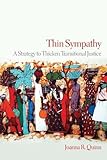Thin Sympathy : A Strategy to Thicken Transitional Justice / Joanna R. Quinn.
Material type: TextSeries: Pennsylvania Studies in Human RightsPublisher: Philadelphia : University of Pennsylvania Press, [2021]Copyright date: ©2021Description: 1 online resource (272 p.) : 1Content type:
TextSeries: Pennsylvania Studies in Human RightsPublisher: Philadelphia : University of Pennsylvania Press, [2021]Copyright date: ©2021Description: 1 online resource (272 p.) : 1Content type: - 9780812299632
- 340.115 23
- KTW441 .Q85 2021
- online - DeGruyter
| Item type | Current library | Call number | URL | Status | Notes | Barcode | |
|---|---|---|---|---|---|---|---|
 eBook
eBook
|
Biblioteca "Angelicum" Pont. Univ. S.Tommaso d'Aquino Nuvola online | online - DeGruyter (Browse shelf(Opens below)) | Online access | Not for loan (Accesso limitato) | Accesso per gli utenti autorizzati / Access for authorized users | (dgr)9780812299632 |
Frontmatter -- CONTENTS -- Preface -- Acknowledgments -- List of Abbreviations -- Chapter 1. Paving the Way -- Chapter 2. Background and History of Conflict in Uganda -- Chapter 3. Slow Decay or Intentional Neglect? -- Chapter 4. The Thin Sympathy Hypothesis and the Sympathetic Continuum -- Chapter 5. Switching On the Thin Sympathetic Response -- Chapter 6. Manufacturing Thin Sympathy -- Chapter 7. Thickening the Transitional Justice Strategy -- Chapter 8. Bridging the Divide -- Chapter 9. The Strength of Thin Sympathy and Transitional Justice -- Appendix 1. Ethnocultural Group Representation in Ugandan Population -- Appendix 2. List of Political Conflicts in Uganda Since Independence -- Notes -- Bibliography -- Index
restricted access online access with authorization star
http://purl.org/coar/access_right/c_16ec
Transitional justice, commonly defined as the process of confronting the legacies of past human rights abuses and atrocities, often does not produce the kinds of results that are imagined. In multiethnic, divided societies like Uganda, people who have not been directly affected by harm, atrocity, and abuse go about their daily lives without ever confronting what happened in the past. When victims and survivors raise their voices to ask for help, or when plans are announced to address that harm, it is this unaffected population that see such plans as pointless. They complain about what they perceive as the "needless" time and money that will be spent to fix something that they see as unimportant and, ultimately, block any restorative processes.Joanna R. Quinn spent twenty years working in Uganda and uses its particular case as a lens through which she examines the failure of deeply divided societies to acknowledge the past. She proposes that the needed remedy is the development of a very rudimentary understanding—what she calls "thin sympathy"—among individuals in each of the different factions and groups of the other's suffering prior to establishing any transitional justice process. Based on 440 extensive interviews with elites and other thought leaders in government, traditional institutions, faith groups, and NGOs, as well as with women and children throughout the country, Thin Sympathy argues that the acquisition of a basic understanding of what has taken place in the past will enable the development of a more durable transitional justice process.
Mode of access: Internet via World Wide Web.
In English.
Description based on online resource; title from PDF title page (publisher's Web site, viewed 01. Dez 2022)


